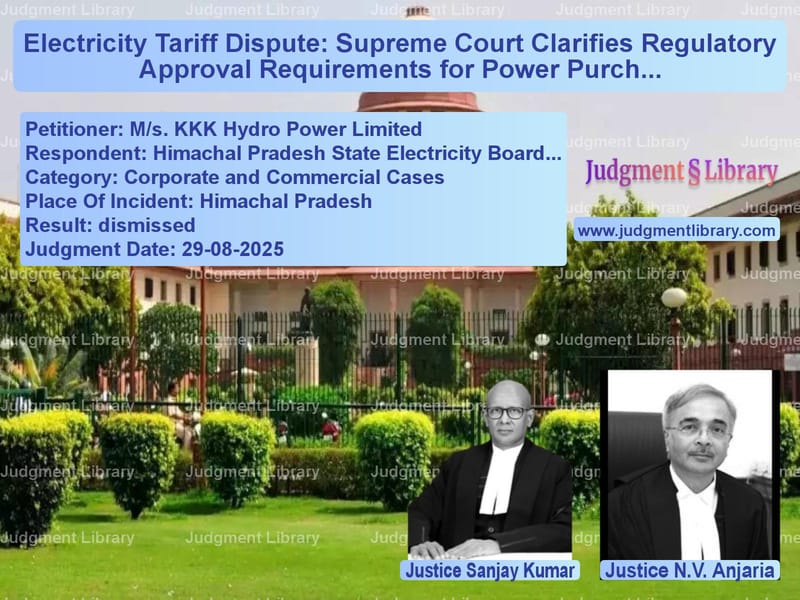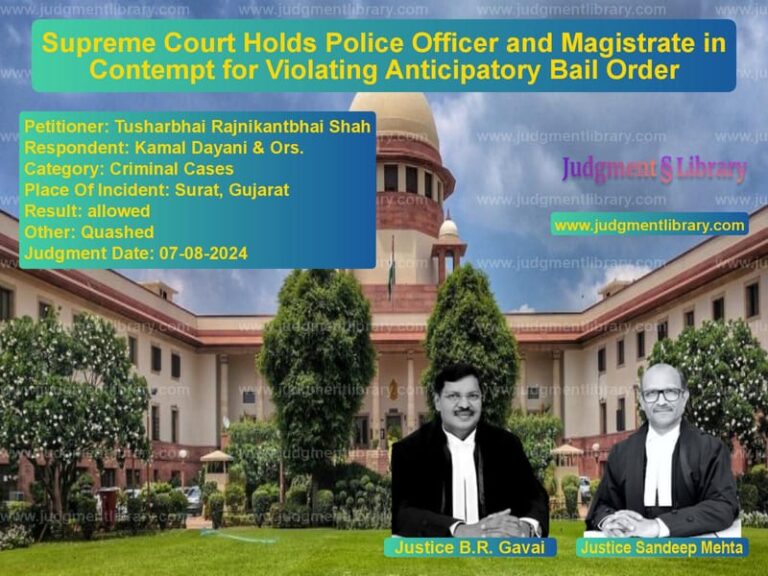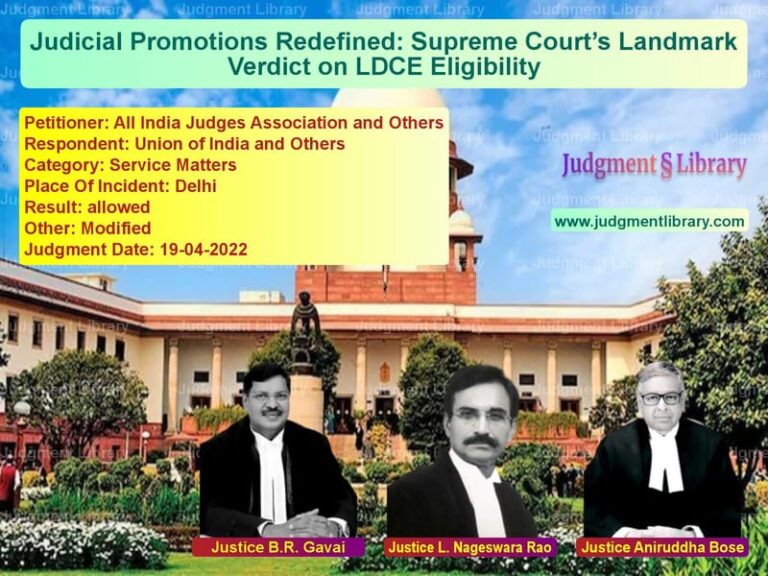Electricity Tariff Dispute: Supreme Court Clarifies Regulatory Approval Requirements for Power Purchase Agreements
The Supreme Court of India recently delivered a significant judgment that clarifies the legal framework governing electricity tariff determination and power purchase agreements in India’s power sector. The case involved M/s. KKK Hydro Power Limited, a private power generator, and the Himachal Pradesh State Electricity Board Limited, concerning tariff rates for electricity supplied from a hydroelectric project.
The dispute centered around whether the power company could claim enhanced tariff rates for its entire 4.90 MW hydroelectric project, including the original 3 MW capacity that was commissioned before the establishment of the electricity regulatory commission, and an additional 1.90 MW capacity added later.
The Background of the Case
The story begins in the year 2000 when M/s. KKK Hydro Power Limited entered into an Implementation Agreement with the Government of Himachal Pradesh to establish the Baragram Hydro Electric Power Project of 3 MW capacity. On the same day, the company executed a Power Purchase Agreement with the state electricity board, fixing the tariff at a firm and fixed rate of ₹2.50 per kilowatt hour. The agreement explicitly stated that ‘this rate is firm and fixed and shall not be changed due to any reason whatsoever’ and was to remain in force for 40 years.
Several years later, in 2005, the power company sought permission to augment the project capacity from 3 MW to 4.90 MW. The government agreed, and a supplementary implementation agreement was executed in 2007. Subsequently, the Himachal Pradesh Electricity Regulatory Commission conditionally approved a draft power purchase agreement for the revised capacity in December 2007.
The Regulatory Framework and Tariff Orders
Meanwhile, significant regulatory developments were taking place. The Himachal Pradesh Electricity Regulatory Commission had been constituted in December 2000 under the Electricity Regulatory Commissions Act, 1998. In 2007, the Commission notified the Himachal Pradesh Electricity Regulatory Commission (Power Procurement from Renewable Sources and Cogeneration by Distribution Licensee) Regulations, which provided for determination of tariff for electricity generated from renewable sources.
Under these regulations, the Commission issued a Tariff Order in December 2007, fixing the tariff for small hydro power projects not exceeding 5 MW at ₹2.87 per kWh. Later, after remand by the Appellate Tribunal for Electricity, the Commission revised this tariff to ₹2.95 per kWh in February 2010.
The Dispute Arises
Relying on this enhanced tariff, M/s. KKK Hydro Power Limited approached the electricity board in April 2010, seeking execution of a supplementary power purchase agreement incorporating the higher tariff of ₹2.95 per kWh. When the board did not respond promptly, the company approached the Commission. However, before the Commission could decide the matter, the parties executed a supplementary power purchase agreement in September 2010, modifying the tariff from ₹2.50 to ₹2.95 per kWh.
The electricity board then started paying the enhanced tariff, but disputes arose regarding arrears for the period from April 2008 to August 2010. The power company filed a petition before the Commission seeking payment of these arrears, while the electricity board filed a separate petition seeking recall/modification of the Commission’s earlier conditional approval order.
The Commission’s Decision
The Commission dismissed both petitions in July 2013. It held that the original 3 MW plant, commissioned in 2004 under a power purchase agreement executed in 2000, was not subject to the Commission’s regulatory powers as it predated the Commission’s establishment. The Commission also found that the supplementary power purchase agreement executed in 2010 was not in conformity with the regulatory framework and had not been approved by the Commission.
The Commission observed that ‘the parties had neither worked out the terms and conditions of their PPA in conformity with the consent given by it nor did they move a petition for review of their tariff, they had no power to do so unilaterally.’
The Appellate Tribunal’s Ruling
M/s. KKK Hydro Power Limited appealed to the Appellate Tribunal for Electricity, which delivered a mixed verdict in October 2014. The Tribunal held that the tariff for the original 3 MW plant could not be redetermined under the 2007 Regulations since it was commissioned before these regulations came into force. However, for the additional 1.90 MW plant commissioned in July 2008, after the regulations came into effect, the Tribunal held that it would be governed by the tariff determined as per the 2007 Regulations.
Read also: https://judgmentlibrary.com/supreme-court-upholds-strict-ibc-timelines-in-landmark-insolvency-case/
The APTEL directed that ‘as the entire capacity of the project is to be injected and evacuated from the same bus bars, a common tariff had to be determined for the power project as a whole’ and held that ‘such tariff would be the weighted average of the respective tariffs envisaged for the 3 MW and 1.9 MW plants.’
The Supreme Court’s Analysis
The Supreme Court, in its judgment delivered by Justices Sanjay Kumar and N.V. Anjaria, provided a comprehensive analysis of the legal issues involved. The Court emphasized the crucial role of regulatory oversight in electricity tariff determination.
The Court made a significant observation about the legal requirement for regulatory approval of power purchase agreements and tariffs: ‘This provision puts it beyond the pale of doubt that fixing of the price for the purchase of electricity is not a matter of private negotiation and agreement between a generating company and a distribution licensee. The price as well as the agreement, i.e., PPA, incorporating such price and providing for purchase of electricity at that price necessarily have to be reviewed and approved by the State Commission under this provision.’
The Court further clarified that ‘a generating company and a distribution licensee cannot, by private agreement, execute a PPA on their own or stipulate tariff therein as per their choice, for supply of electricity within a State, without seeking the review and approval of the Electricity Regulatory Commission under Section 86(1)(b) of the Act of 2003.’
The Court’s Final Decision
While the Supreme Court found legal errors in the Appellate Tribunal’s approach, it chose not to interfere with the final outcome for practical reasons. The Court noted that the electricity board had not filed an appeal against the Tribunal’s order and had accepted the direction to compute a weighted average tariff. Additionally, the revised tariff of ₹2.60 per kWh had been implemented through a supplementary power purchase agreement in November 2015 and had been operational for a considerable time.
The Court stated: ‘We would not wish to upset the apple cart and start the process all over again. More so, as the HPSEB did not even choose to file an appeal against the impugned order.’ However, the Court took the opportunity to ‘clarify the legal position so as to obviate a similar error being committed in future.’
The Supreme Court dismissed the appeal filed by M/s. KKK Hydro Power Limited, rejecting its claim for the enhanced tariff of ₹2.95 per kWh for the entire project, including the original 3 MW plant.
Broader Implications
This judgment has significant implications for India’s power sector. It reinforces the authority of electricity regulatory commissions in overseeing power purchase agreements and tariff determination. The ruling makes it clear that private negotiations between power generators and distribution companies cannot override the regulatory framework established under the Electricity Act, 2003.
The decision also highlights the importance of obtaining proper regulatory approvals for any modifications to power purchase agreements, especially those involving tariff changes. Power generators and distribution licensees must ensure compliance with regulatory requirements rather than relying on bilateral agreements that lack regulatory sanction.
For existing power projects seeking to expand their capacity, the judgment clarifies that different components of the same project may be subject to different regulatory regimes based on when they were commissioned relative to relevant regulations coming into force.
The Supreme Court’s ruling thus provides much-needed clarity on the regulatory oversight of power purchase agreements and reinforces the statutory framework governing India’s electricity sector, ensuring that consumer interests are protected through proper regulatory scrutiny of electricity tariffs.
Petitioner Name: M/s. KKK Hydro Power Limited.Respondent Name: Himachal Pradesh State Electricity Board Limited and others.Judgment By: Justice Sanjay Kumar, Justice N.V. Anjaria.Place Of Incident: Himachal Pradesh.Judgment Date: 29-08-2025.Result: dismissed.
Don’t miss out on the full details! Download the complete judgment in PDF format below and gain valuable insights instantly!
Download Judgment: ms.-kkk-hydro-power-vs-himachal-pradesh-sta-supreme-court-of-india-judgment-dated-29-08-2025.pdf
Directly Download Judgment: Directly download this Judgment
See all petitions in Contract Disputes
See all petitions in Corporate Compliance
See all petitions in Company Law
See all petitions in Judgment by Sanjay Kumar
See all petitions in Judgment by N.V. Anjaria
See all petitions in dismissed
See all petitions in supreme court of India judgments August 2025
See all petitions in 2025 judgments
See all posts in Corporate and Commercial Cases Category
See all allowed petitions in Corporate and Commercial Cases Category
See all Dismissed petitions in Corporate and Commercial Cases Category
See all partially allowed petitions in Corporate and Commercial Cases Category







